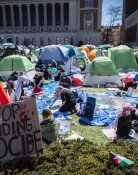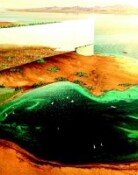Will Obama inherit N.K.’s nuke completion to successor?
Will Obama inherit N.K.’s nuke completion to successor?
Posted September. 12, 2016 06:51,
Updated September. 12, 2016 07:08
U.S. President Barack Obama issued a statement on Friday local time immediately after his return from an Asian tour. On North Korea’s fifth nuclear test, Obama said in the statement that he agreed on the South Korean and Japanese leaders to take additional stern measures including new sanctions. His reaction is no different from the pattern in which the U.S. president condemned North Korea and spearheaded the U.N. Security Council’s adoption of statement and resolutions for sanctions against Pyongyang's nuclear tests conducted during his term in office. If this practice continues, chances are high that Obama will be remembered in history as a president who failed to block the North from advancing its nuclear capabilities.
Obama’s North Korea policy "strategic patience" provides that unless North Korea changes its stance towards nuclear weapons and missiles, the U.S. will not come to the negotiating table. When Pyongyang launched the long-range Kwang Myong Song 2 missile in April 2009, about two months after his inauguration, and conducted its second nuclear test one month later, the Obama administration postponed dealing with Pyongyang at the pretext of "strategic patience." The U.S. reached an agreement that called for linkage between the North’s halting of nuclear activities and its food aid to the Stalinist country on Feb. 29, 2012, but the agreement ended up collapsing after the North fired the long-range Kwang Myong Song 3 missile two months later.
The New York Times recently claimed that permanent resolution going beyond sanctions would warrant negotiations in whatever form, but negotiations will only give North Korea time to complete its nuclear development while avoiding sanctions. The U.N. sanctions have had little effect because China has repeatedly backed Pyongyang to prevent the North from collapsing. Again this time around, the UN Security Council has immediately started steps to take additional stern measures that will fill loopholes in Resolution 2270 against North Korea, which the council adopted after the North’s fourth nuclear test, but many watchers have doubt about such measures.
If President Obama intends to change the thinking of Chinese President Xi Jinping and North Korean leader Kim Jong Un, he should put into practice his resolute determination that he will fundamentally resolve the North Korean nuclear issue. He should not even think about only managing the situation on the Korean Peninsula and hand over the issue to his successor who will be elected in the November presidential election. When choosing him as the winner of the 2009 Nobel Peace Prize, the Nobel Prize committee said that it highly praised Obama's vision of a world free of nuclear weapons. Even if Obama resolved the Iranian nuclear issue through negotiations, he could see his reputation as a Nobel laureate significantly tarnished if he leaves unchecked Pyongyang that is far more dangerous.
Under a circumstance wherein the North is determined to strengthen its nuclear armament no matter what, Washington's provision of nuclear umbrella to the Korean Peninsula is hardly sufficient. In South Korea, mounting voices are calling for nuclear armament. Now that it has become clear the North Korean nuclear issue cannot be resolved while leaving Kim Jong Un intact, the U.S. should seek historical resolution given that the ultimate reunification of the peninsula. President Obama, who has suffered enough damage due to Pyongyang, should come up with measures that the next U.S. administration will put into action continuously and resolutely. We hope that the U.S. will exert efforts to protect peace in North East Asia in collaboration with South Korea and Japan under such a big vision.
한기흥기자 eligius@donga.com
Headline News
- N. Korea launches cyberattacks on S. Korea's defense companies
- Major university hospital professors consider a day off each week
- Italy suffers from fiscal deficits from ‘Super Bonus’ scheme
- Inter Milan secures 20th Serie A title, surpassing AC Milan
- Ruling and opposition prioritize spending amid tax revenue shortfalls







